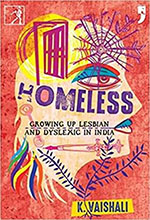Homeless, a memoir, is a book about a young woman struggling with coming to terms with the complexity of her life. Although how much of it is autobiographical has not been clearly mentioned in the book, based on the author’s social media presence, the book is a personal reflective journey along with an effort to bring to fore the challenges and struggles of being lesbian in India. Despite homosexuality being decriminalized, popular perceptions haven’t stepped far away from stereotypes and misinformation. The book provides an inside account of a lesbian discovering her sexuality and facing everyday discrimination, snide remarks, fearing social boycott, and dealing with the constant inner debate of choosing whether to come out to the world or stay closeted.
The book will appeal to youth on the margins at many levels. The protagonist has a late diagnosis of dyslexia and dysgraphia. Along with this, at least partly stemming from a dysfunctional family, she suffers from several psychological disorders, including depression, anxiety and/or panic disorder and, obsessive-compulsive disorder. Identifying as a lesbian and struggling to hide her identity in a predominantly heterosexual world that gives little indication of understanding and acceptance, the book has the potential to serve as a cathartic tool to many young women undergoing similar exploration and identification.
The book starts with a young woman describing her experience of moving to different houses, living across cities and trying to make sense of her life as her family struggles with alcoholism, domestic violence, and financial instability. In the first chapter, the author describes the episode of coming out to her mother. Steeped in Brahmanical values, her mother is appalled that she could engage in premarital sex and being lesbian becomes secondary. The distance in the family widens as her mother refuses to accept her and she is forced to step out. Interestingly, Vaishali writes several reflective episodes reminiscing about the decisions she has taken. Were they bold stands of freedom or sheer conveniences that led her to move out of the city and away from her mother? These reflective episodes about her family, her friends, and her identity are indicative of the inner turmoil that she undergoes.
An important aspect of her life is her diagnosis of learning disabilities. Being labelled as ‘the same illness from the Bollywood film’ was enough to trivialize her diagnosis. Being diagnosed very late in life, she found school learning difficult and was lumped with additional classes and teachers who never understood her problem. Dropping out of different courses and the inability to get university education to normalize addressing learning difficulties did not help her academic career or her reputation in her ‘Brahmin’ family. All of her life surrounded her bargaining with her mother for special allowances in exchange of saving the family face.
Vaishali documents the struggles in finding her identity, defying social norms of dress, behaviour, gender expression and sexuality. None of this is easy for anyone. When this is compounded with family discord and psychological disorders, it creates a world that is hard to believe. The book is inspirational as a survivor’s story.
Many of the psychological disorders have been talked about very loosely. While dyslexia and dysgraphia are mentioned to have been clinically diagnosed with due process, for others, depression, anxiety and obsessive-compulsive disorder, there is no clear mention of clinical diagnosis. In case of any kind of clinical assessments in medicine, it is better to err on the side of caution and this seems to be an area where the author has not exhibited due care. The benefit of doubt stems from the book largely presenting her experience and thus has artistic licence.
The book is a grim reminder that five years after decriminalization of homosexuality in India, the society finds it difficult to accept people on the sexuality spectrum in their homes, in educational institutions and work places. Similarly, despite being included in the Rights of Persons with Disabilities Act 2016, many psychological disorders remain invisible, undiagnosed and untreated. Our society is far from being inclusive. Like changes in law and acts, this book is a tiny step ahead in making the society more open and accepting. All people have to do is to pick up and read it.
November 2023, volume 47, No 11

